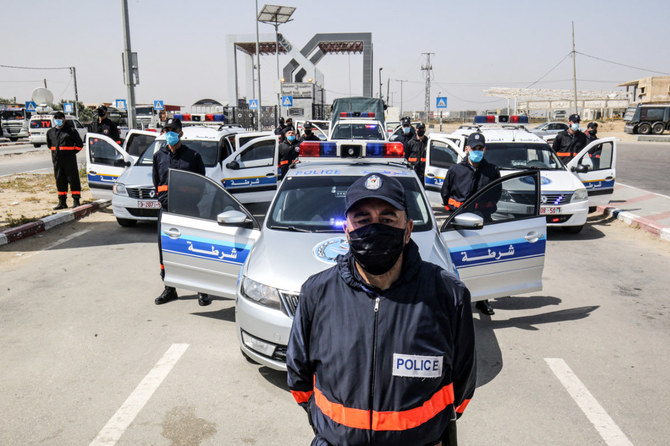JERUSALEM: Israel is looking into an alternative local governing body for Gaza, the defense minister said Sunday, proposing a future beyond Hamas but giving no idea who those challengers might be.
Defense Minister Yoav Gallant’s comments came at a time of new uncertainty in the eight-month war. Israeli Prime Minister Benjamin Netanyahu is under growing pressure from many Israelis to accept a new ceasefire deal proposed by US President Joe Biden, while far-right allies threaten to collapse his government if he does.
Gallant, part of Israel’s three-member War Cabinet who recently urged the government to have a detailed postwar plan for Gaza, said in a briefing that “we seek a governing alternative to Hamas. The framework for this includes isolating areas, removing Hamas operatives in these areas and bringing in other forces that will enable the formation of a governing alternative.”
That will achieve Israel’s goals of removing Hamas’ military and governing authority in Gaza and returning home the remaining hostages taken in the Oct. 7 Hamas attack that sparked the war, Gallant said. He stressed that “we will not accept the rule of Hamas at any stage in any process aimed at ending the war.”
In response to questions, an Israeli defense official told The Associated Press that Gallant hopes to enable isolated, Hamas-free areas in Gaza to become “hubs of local government” and identify forces that can enable a longer-term formation of a government.
Israel is looking for “local non-hostile actors,” the official said, adding that Gallant believes that “Palestinians should be governing Palestinians.” Israel would facilitate surges of aid to the areas, and the local forces would be responsible for distributing it to strengthen their authority.
But that approach is challenging and has failed before, one expert said.
“I haven’t heard of any local players that are brave enough to present themselves as an alternative to Hamas,” said Michael Milshtein, an Israeli analyst of Palestinian affairs at Tel Aviv University and a former military intelligence officer.
Milshtein said Gallant’s “wishful thinking” would amount to a suicidal mission for any local leader. Hamas has threatened anyone cooperating with Israel’s government.
“Although Hamas suffered severe damage over the past eight months, their impact on the public is still very strong,” he said.
Milshtein noted that Israel has tried this approach in the past. In the 1970s and ‘80s, Israel tried to establish “village leagues,” empowering local Palestinian leaders.
“They were considered in the eyes of Palestinians as collaborators, and it ended in a very tragic manner,” he said. Unless Israel maintains a constant presence in Gaza, any “alternative forces” they try to install will be too fragile, he added.
Netanyahu has said Israel will maintain security control over Gaza but delegate civilian administration to local Palestinians unaffiliated with Hamas or the Western-backed Palestinian Authority, which governs parts of the occupied West Bank. He has ruled out a path to Palestinian statehood.
Top ally the US has proposed that a reformed Palestinian Authority would govern Gaza with the assistance of Arab and Muslim nations.
The Hamas attack on Oct. 7 in southern Israel killed around 1,200 people — mostly civilians — and abducted about 250. About 100 hostages remain in Gaza, along with the bodies of around 30 more.
Over 36,430 Palestinians have been killed in Gaza by Israel’s offensive, according to Gaza’s Health Ministry. Its count doesn’t differentiate between civilians and combatants. Israel blames Hamas for civilian deaths, accusing it of operating from dense residential areas.
At least five people including a young girl were killed Sunday in a strike on a street in Zawayda, central Gaza, according to Palestinian health officials and AP journalists at Al-Aqsa Martyrs hospital who counted the bodies.
The United States continued to press Israel on the ceasefire proposal outlined by Biden, who said Friday it’s time for the war to end. Many of Gaza’s 2.3 million people have been displaced and shelter with few supplies, large parts of the territory have been destroyed and the United Nations has warned of “full-blown” famine.
The deal’s first phase would last six weeks and include a “full and complete ceasefire,” a withdrawal of Israeli forces from all densely populated areas of Gaza and the release of a number of hostages, including women, older people and the wounded, in exchange for the release of hundreds of Palestinian prisoners. Biden acknowledged that moving into the next phase of the deal would require more negotiations.
“This was an Israeli proposal. We have every expectation that if Hamas agrees to the proposal – as was transmitted to them, an Israeli proposal – then Israel would say yes,” White House National Security Communications Adviser John Kirby told ABC.
Also Sunday, officials from Egypt, Israel and the US ended a meeting in Cairo without any apparent agreement to reopen the crucial Rafah crossing into Gaza, which has been closed since Israel took over the Palestinian side of it in early May, Egypt’s state-run television channel Al-Qahera News reported.
Israel’s military continues to press into Rafah, Gaza’s southernmost city, in search of what’s been described as Hamas’ last stronghold even as the militants regroup elsewhere in the territory.
Citing an unnamed official, Al-Qahera News said Egypt affirmed that Israel must withdraw its forces from the Palestinian side of the crossing before it can reopen. The report said Egypt accused Israel of blocking the delivery of badly needed humanitarian aid to Gaza, which Israel denies.






















